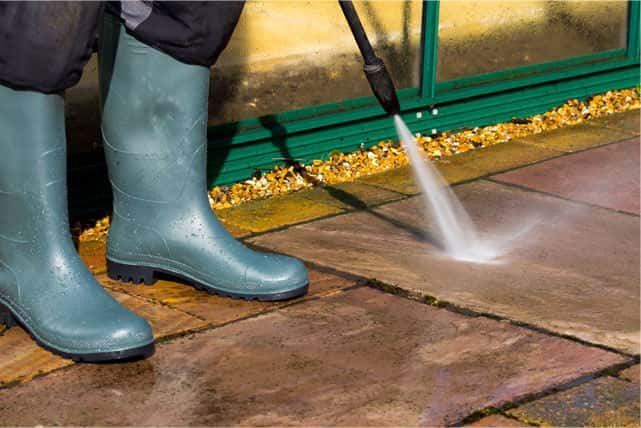
Maintaining Outdoor Porcelain Patio and Natural Stone
There are several ways to maintain your patio, and a few simple things will keep it looking its best year after year. The best way to help with the maintenance of your patio is to select the correct product in the first place, guidance on this can be found on our product selection guide available to view and download on our website.
WHAT NOT TO USE
It is very important not to try to clean natural stone paving especially Indian sandstone with Acid based clearers as well as some Fungicides that are used to remove Lichens can permanently discolour your paving. For further information on Acid damage on natural stone paving please refer to our Tech guide: Rust Stains on Natural Stone
SEALING
The first thing to consider with regards to maintaining your patio is the application of a sealer, these reduce any mold and algae build up developing on the surface of the slabs making cleaning much easier, and a simple case of hosing down the area and then scrubbing with a stiff brush. This is the simplest way of keeping your patio maintenance to a minimum and protecting against water and oil-based staining which are particularly common in eating/ drinking areas such as barbeques, and outside seating.
With natural stone we would always recommend using a water based impregnating sealer such as Universeal Hydroseal or Ultimate Stone Enhancer.
Porcelain paving can also be sealed to improve its stain resistance properties but is not as crucial as sealing natural stone paving products. We would recommend using Patio Porcelain floor tile sealer from Universeal, but this is best used by a professional contractor as mistakes with this sealer are extremely hard to rectify.
Please ensure that the area to be sealed is completely clean, dry, free from debris and surface staining and that you have at least 24 hours of dry weather ahead.
Application guidance is available on the bottles must always be always followed to ensure successful application. From more information on these products please visit universealsealants.co.uk
There are many other sealers on the market, but it is important to avoid topical sealants that do not penetrate the surface of the paving and only remain on the surface, these sealers are easily damaged and will look unsightly quickly after installation.
DAY TO DAY CLEANING
Leaves and debris should be removed from your paving with a stiff broom on a regular basis, do not allow stand on the surface for extended periods of time as the tannins in the leaves can stain paving slabs regardless of type.

PRESSURE WASHING
Periodically you will need to use a pressure washer, to clean off any stubborn dirt or debris. This can be done as often as is necessary with natural stone and porcelain paving products unlike cleaning a concrete or manufactured paving slabs where the surface can be damaged. Only a wide spray nozzle should be used to help reduce damage to the pointing between the slabs.
CHEMICAL CLEANERS
If you have substantial buildup of debris and dirt or any algae, we recommend using a product called New clean 60 before pressure washing your paving. This product will eliminate stubborn materials between the slabs and grout such as weeds, green slime, leaf mulch and helps remove black spots.
When using this product please wear old clothes and shoes as the cleaning product contains chlorine and will can damage carpets and clothes. Please also ensure that this product is not allowed into ponds and water courses and is thoroughly washed off after use.
REMOVING LICHENS
The best and simplest way to remove lichens is to use a cleaner specifically formulated for natural stone paving, sure as New Clean 60 from Universeal. This treatment along with pressure washing and brushing will normally remove most lichens but multiple treatments may be necessary. Do not use fungicides that contain iron because the iron will make some of the minerals in sandstone turn brown and rusty coloured.
IF YOU NEED ANY ADVICE PLEASE CONTACT A MEMBER OF STAFF AT YOUR LOCAL DEPOT, ON ONE OF THE NUMBERS BELOW, WHO WILL BE HAPPY TO ADVISE YOU ON ANY OF OUR PRODUCTS.

